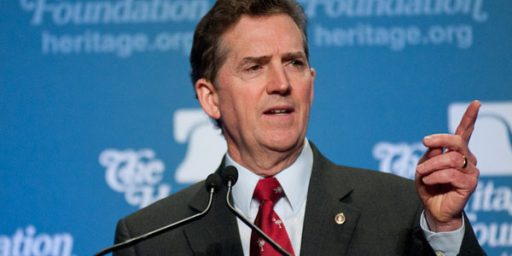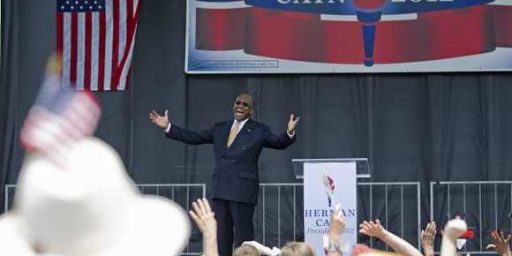Tea Party Capitol Hill Debt Ceiling Rally Fizzles
It doesn’t sound like today’s Tea Party rally on Capitol Hill had the intended effect:
It had all the makings of a big time tea party rally: Presidential candidate Herman Cain, conservative Sens. Jim DeMint of South Carolina, Rand Paul of Kentucky and Mike Lee of Utah all showed up outside the Capitol Wednesday to urge members to “hold the line” against a deficit reduction compromise.
The only thing missing? A big audience.
At the start of the rally, which was organized by the American Grassroots Coalition and Tea Party Express, there were roughly 15 attendees waiting to hear the conservative lawmakers speak. By the time the senators had spoken there were still fewer than 50 tea partiers in attendance.
But that didn’t stop the conservatives from turning up the heat on the proposals Speaker John Boehner and Senate Majority Leader Harry Reid are preparing in the Capitol. Paul panned the Boehner proposal, saying that it “would cut next year $1 billion dollars,” and eliciting jeers from the crowd. “That is insignificant and not meaningful reform,” he said.
As DeMint spoke, Cain, who did not address the crowd, told reporters, “I believe that president and the Democrats have created this crisis to gain leverage over a plan to raise taxes, and the American people are saying that’s a non-starter.” Cain said he hoped Congress would “do the right thing, and the right thing is don’t raise the debt ceiling, get serious about cuts, and don’t raise taxes.”
“I don’t buy that there is going to be a catastrophe,” Cain said when asked what will happen if a deadline isn’t reached by August 2nd.







Having buyer’s remorse about Rand Paul, yet?
cue the “real Americans couldn’t go, we all have jobs” excuse.
“… the debt kamikazes still seem to be prevailing in Congress , so maybe the Tea Party will “win” this after all. If that happens, the rest of us will lose.”
What the Tea Partiers are really after is for the nation to stop spending more than it takes in, and reduce our overall debt. Given that if we’re actually having to borrow money to operate and pay our current debt, puhleeze explain how that will in any way whatsoever cause ” the rest of us to lose.” Quite the opposite; simple logic and arithmetic should assist even Doug Mataconis and the Democrats in Washington to understand that one cannot continue to borrow, spend, spend more, borrow more … etc. … etc. … and have any outcome other than national bankruptcy – which will indeed cause all of us to lose.
Bottom line, this really shouldn’t be a Democrat issue, a Republican issue, or a Tea Party issue … it is a common sense issue. It is utterly impossible to continue our present trajectory … it’s clearly unsustainable.
@Richard:
So who is advocating for trying to sustain our present trajectory?
Please be specific.
@Richard:
Richard, I have a mortgage. And I have a car loan. And I am a union carpenter (if I was a non-union carpenter the situation would be the same). Construction is one of the few businesses where we actively work our selves out of a job> (this project requires 200 carpenters, when it is done we only have places for 15…. until the next big job we get)So we actively work as hard as we can so that we are the last to get laid off and the first to get rehired. (some guys don’t get this)
So, when I am working, I save like crazy and pay off every bill I can. When I get laid off, I cut back as best I can, borrow if I have to, and stretch my savings as far as I can. To me? That is fiscal responsibility.
The GOP game plan in 2001 was “F*ck that saving, F*CK that paying down the debt, let US party like their is no tomorrow!!!”
I guess I am weird.
Psst, here’s a little clue, part of reaching those goals involves raising taxes…
Umm, there’s that little thing called the debt ceiling…unless you are one of those people who think that it would be just dandy not to raise that ceiling…
@Pug: Pug, not accusing anyone of doing so here, just addressing what the statement …
… appears to me to imply … as though a group pushing for substantially reducing the debt and breaking the dead-end cycle of borrowing from Peter to pay Paul are somehow harmful to our nation’s fiscal condition. It never ceases to puzzle me how it is that our politicians of all stripes have, for years, followed the completely unsustainable cycle of borrow, spend, spend more, borrow more … etc. … etc. …, that I referred to in my previous comment … and not realize and/or care that doing so will have any outcome other than national bankruptcy.
Again, this isn’t really just a Democrat, Republican, or a Tea Party issue. Reasonable minds should be able to at least agree that if we have to continue increasing the debt limit in order to pay our bills, and then continue to spend without substantially reduce our debt, there is one and only one eventual outcome – national bankruptcy. And attacking one group or another, especially one pushing for what should be considered a common sense approach that’s based on the fact that no family, no company, no nation can continue to operate indefinitely on borrowed money.
@OzarkHillbilly: @OzarkHillbilly: Ozark, you’re exactly right … and unfortunately, the present administration is doing the same thing … unabated, and supported by its party.
Equally unfortunate is the fact that, going by past experience, if and when the WH and control of Congress changes hands … unless there is a substantial change in attitude in our country … and that includes both parties … we’ll see a repeat of the same thing, etc., etc., etc. – until we’re bankrupt.
By the way, I didn’t mean to say “Given that if we’re actually having to borrow money to operate and pay our current debt, puhleeze explain how that will in any way whatsoever cause ” the rest of us to lose.”
What I meant to say was “puhleeze explain how that will in any way whatsoever result in causing the rest of us to lose.” As should be evident from my comment, my entire emphasis was on paying off our debt and not spending and borrowing more than we can take in and pay off.
@Richard: President Bush, abetted by Greenspan, said in 2001 that paying off our debt would destroy the economy, and therefore we had to piss away our balanced budgets and Clinton-era plans to get rid of the debt by giving massive tax breaks to millionaires and billionaires.
You want to fix the debt? Great, go back and fix the thing that caused it. Put tax rates back where they were.
Until you’re willing to do that, you’re just another Tea Party poser looking for an excuse to take the country back to the 19th century.
@Richard:
If what you mean is that we cannot continually increase the debt limit in terms of number of dollars, that is false. The debt ceiling has been increasing for the past 50+ years (see the figures in the link below for details). What matters is not the amount of dollars in absolute terms but the amount in terms of the burden of servicing that debt. The debt/GDP is a (rough) metric for that burden. You are correct in saying that we can’t keep increasing debt at a rate that is more than the growth rate of our economy.
But, many people who favor raising the debt ceiling understand very well the need to decrease the growth of the national debt. Some of them have proposals in mind that you would probably disagree with (but, all such proposals are controversial) . For example, doing all of: winding down our current wars, letting the Bush tax cuts expire, reducing the growth of medicare/medicaid costs to somewhere near the inflation rate, and some additional cuts in defense spending would go a long way towards fixing our long-term fiscal problems.
I have no real problem with the Republicans using the debt limit to force spending cuts. I do have problems with the failure of the Republicans to eventually take the best deal they can negotiate, and with the idea that we shouldn’t raise the debt limit at all.
Two problems with not raising the debt limit right now are: 1) Suddenly removing $1 trillion+ of spending from the economy while we’re trying to recover from a recession is going to have pretty awful economic effects — more so than if we reduced spending more gradually. 2) The economic consequences and the government program cuts required are not politically sustainable — the ceiling will be eventually be lifted because politicians will wilt in the face of voter anger, and we’ll be stuck with a lower bond rating and higher interest rates for nothing. Those are some of the ways the rest of us lose if the limit is not raised.
http://www.theatlantic.com/business/archive/2011/04/the-us-debt-ceiling-a-historical-look/238061/
Well, they’re old, and it’s hot…
Oh it’s not for nothing. They will be able to sit amongst the wreckage and tell themselves how it is all Obama’s fault. What is the good of the country compared to that guilty pleasure?
On another note, when is bithead going to show up to tell us that there were really a million people at the rally and the MSM is covering it up?
@Richard:
Um…. Bill Clinton handed George W. Bush surpluses as far as the eyes could see.
SURPLUSES!
That means each year, the debt would be reduced.
And rather than continue the path, Bush gave tax cuts, started two wars which he didn’t even put into the real budget, and created the largest entitlement program since the New Deal. And, now, NOW, you’re upset about increased spending?
As Richard Pryor used to say… “______, please!”
Given that the Tea Party radicals rejected a deal to reduce the debt, that included modest tax increases mixed with spending cuts, it is clear that this is not about the debt at all, its about reducing taxes.
Which is to say it is about letting the top 2% enjoy a free ride of enjoying all that the American economy has to offer, without having to pay their fair share.